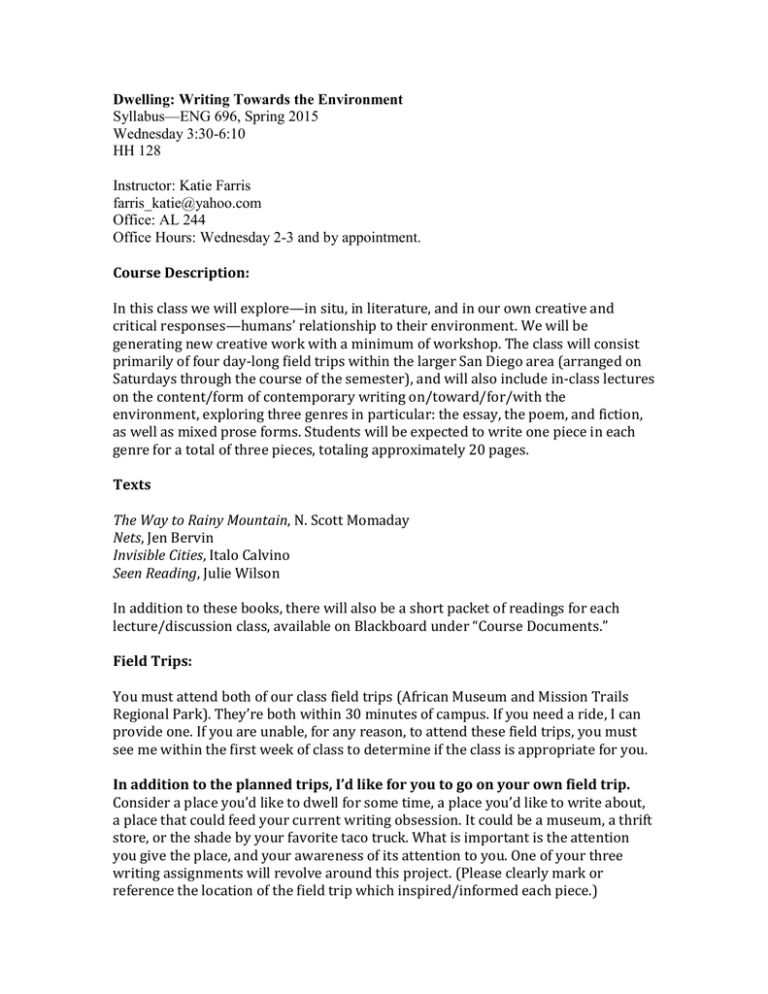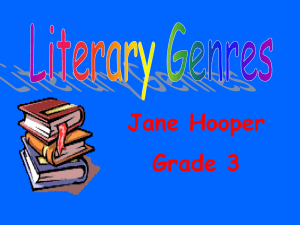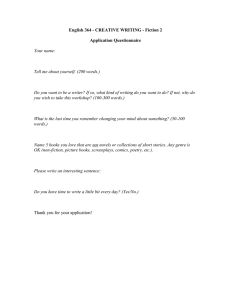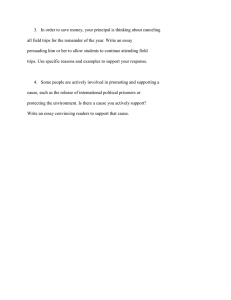Dwelling: Writing Towards the Environment Syllabus—ENG 696, Spring 2015 Wednesday 3:30-6:10
advertisement

Dwelling: Writing Towards the Environment Syllabus—ENG 696, Spring 2015 Wednesday 3:30-6:10 HH 128 Instructor: Katie Farris farris_katie@yahoo.com Office: AL 244 Office Hours: Wednesday 2-3 and by appointment. Course Description: In this class we will explore—in situ, in literature, and in our own creative and critical responses—humans’ relationship to their environment. We will be generating new creative work with a minimum of workshop. The class will consist primarily of four day-long field trips within the larger San Diego area (arranged on Saturdays through the course of the semester), and will also include in-class lectures on the content/form of contemporary writing on/toward/for/with the environment, exploring three genres in particular: the essay, the poem, and fiction, as well as mixed prose forms. Students will be expected to write one piece in each genre for a total of three pieces, totaling approximately 20 pages. Texts The Way to Rainy Mountain, N. Scott Momaday Nets, Jen Bervin Invisible Cities, Italo Calvino Seen Reading, Julie Wilson In addition to these books, there will also be a short packet of readings for each lecture/discussion class, available on Blackboard under “Course Documents.” Field Trips: You must attend both of our class field trips (African Museum and Mission Trails Regional Park). They’re both within 30 minutes of campus. If you need a ride, I can provide one. If you are unable, for any reason, to attend these field trips, you must see me within the first week of class to determine if the class is appropriate for you. In addition to the planned trips, I’d like for you to go on your own field trip. Consider a place you’d like to dwell for some time, a place you’d like to write about, a place that could feed your current writing obsession. It could be a museum, a thrift store, or the shade by your favorite taco truck. What is important is the attention you give the place, and your awareness of its attention to you. One of your three writing assignments will revolve around this project. (Please clearly mark or reference the location of the field trip which inspired/informed each piece.) Writing Assignments: Over the course of the semester, you will be expected to write three NEW pieces, one in each of the following genres: non-fiction/mixed prose form, poetry, and fiction. I’d like for one of your pieces (whichever one you prefer) to revolve around your own personal field trip (see “Field Trips” section), and one to revolve around one of the class field trips. The last piece is up to you. For poetry, you’ll need to write 2 poems, 1-2 pages total (up to 800 words). For both nonfiction/mixed genre and fiction, expect to write 3-10 pages (up to 4000 words). You may choose two of your three pieces to be workshopped. The idea is for you to get a chance to try new things without necessarily having to invest a great deal of time—that’s why the literature we’re discussing errs on the shorter and more fragmentary side. You’ll also be composing 3-6 creative pieces, several Tweets, and a short essay for Julie Wilson’s Seen Reading San Diego Project. She’ll come into class to speak more about the project on February 4th. Particularly excellent student work may be published on her blog and be among the very first publications for Seen Reading San Diego. This is a fantastic opportunity for publication and engagement with a thriving community outreach project. I expect you to put significant effort into these pieces! Note that you can continue working on your current project if you’re interested— my only caveat is that you must work in an alternate form. Reenvision your novel as a poem. Reimagine your poetry as essay. Please do not give excerpts of a work in progress for another class. Schedule of Classes 21 January— Intro to Class Homework: Read The Way to Rainy Mountain and the Essay Handout available on Blackboard under “Course Documents” 28 January—Lecture/Discussion The Way to Rainy Mountain; “Essay Handout.” Homework: Read Seen Reading. Post your non-fiction/hybrid work on Blackboard by Friday, February 6, at 10 pm. 4 February—Q&A with author Julie Wilson of Seen Reading, Discussion of end-ofsemester Seen Reading project. Homework: Workshop Group A. 7 Saturday, 10:30 am—Field Trip to the African Museum, Old Town. Rain or shine! 11 February—Nonfiction/Mixed Genre Group A Workshop Homework: Workshop Group B. 18 February—Class Cancelled (African Museum Field Trip) 25 February —Nonfiction/Mixed Genre Group B Workshop Homework: Read Nets; “Ecopoetics Handout” 4 March— Lecture/Discussion “Ecopoetics Handout,” Nets Jen Bervin Homework: Post Poetry on Blackboard by Friday, March 13, at 7 pm. Workshop Groups A and B for 18th March. Saturday, March 7th— Field Trip, Mission Trails Regional Park (rain date: March 8th) 11 March—Class Cancelled (Mission Trails Regional Park Field Trip) Homework: See 4th March. 18 March —Poetry Workshop Homework: Read Invisible Cities, watch Artbound episode on the opera, available at http://www.kcet.org/arts/artbound/counties/losangeles/artbound-special-episode-invisible-cities.html. I also highly recommend that you download and listen to the opera, adapted by Christopher Cerrone; we’ll be listening to portions of it in class. 25 March—Lecture/Discussion on Narrative, Invisible Cities Homework: Post your fiction on Blackboard by Friday, 10th April, at 7 pm. 1 April—SPRING BREAK Homework: I’m not that cruel. 8 April—Class Cancelled (Individual Field Trips) Homework: Workshop Group A 15 April—Fiction Workshop Group A Homework: Workshop Group B 22 April—Fiction Workshop Group B Homework: Complete Documentation of Seen Reading Projects; Prepare for Presentations on the 6th May. 29 April—Meeting for Invisible Cities Opera screening/discussion of “The Circular Ruins” and “Ant Colony.” 6 May—Seen Reading Presentations



